Aussie farmer shipping ‘beautiful melons’ to Japan rather than deal with Coles and Woolworths
A Queensland farmer has joined a growing chorus accusing the major supermarkets of profit-gouging on fruit and vegetables.
Retail
Don't miss out on the headlines from Retail. Followed categories will be added to My News.
A Queensland farmer has joined a growing chorus accusing the major supermarkets of profit-gouging on fruit and vegetables, saying he now exports most of his melons to Japan to avoid dealing with Coles and Woolworths.
Shaun Jackson, 62, owner of Daintree Fresh in far north Queensland’s Lakeland, has warned Aussie consumers face a looming crisis as growers “across the country” exit the industry in coming years, predicting shortages and steep price increases.
“I guarantee you that people in Australia are going to run down on food,” Mr Jackson said.
“It’s going to become super expensive. There’s no one following [in the industry]. Apart from that 30 per cent that want to leave, ask how many have got their sons or kids coming through — and why would you? I start at five in the morning and finish at seven or eight at night. I’ve worked seven days a week for the last four months.”
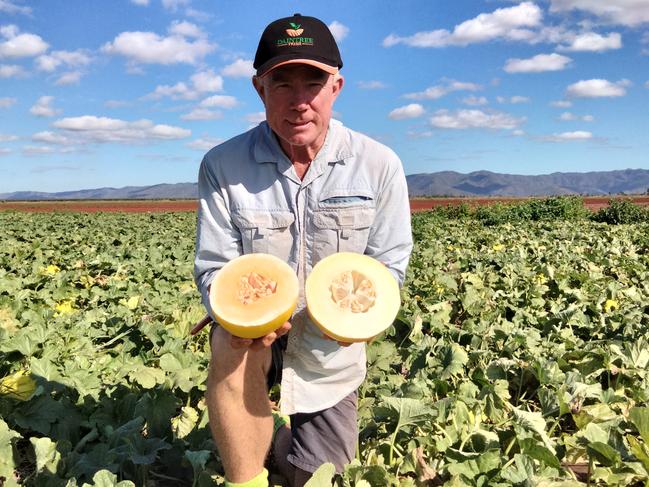
‘Can’t survive’
A survey published in July by peak body AUSVEG found 34 per cent of vegetable growers were considering leaving the industry in the next 12 months.
“Right now I can genuinely say to you there are people looking to exit the industry that have been farming for generations,” said Rachel Chambers, chief executive of Queensland Fruit & Vegetable Growers (QFVG).
“There are people on debtors lists that have not paid their bills that have never been there before. People who have never spoken up are speaking up now saying, ‘I can’t survive any longer.’ Unless something changes, the fresh produce industry in Australia is at immense risk.”
AUSVEG chief executive Michael Coote said Australian growers provide more than 98 per cent of the fresh vegetables sold in the country.
“If we want to preserve Australia’s supply of fresh, high-quality, safe produce, we must ensure growers are being paid a fair price and treated fairly so they can stay in business,” he said.
Earlier this week, Victorian farmer Ross Marsolino from Natural Earth Produce revealed he was walking away from a $2 million, 80-acre zucchini crop, blaming high prices at the supermarkets.
“We’re not retailing the right price to be able to keep the product moving and selling, plain and simple,” he said. “The supermarkets are making too much profit out of our crops. We can’t survive.”
Mr Jackson agreed “the real issue is the supermarkets”.
“The cost to return [for growers] is ridiculous,” he said.
“I have to lay plastic, I have to culture my ground with expensive tractors, use fuel. I buy $300,000 worth of seed, three months later I start picking. By that stage I’ve spent $1 million, then 30 days after they get my fruit they start to pay.”
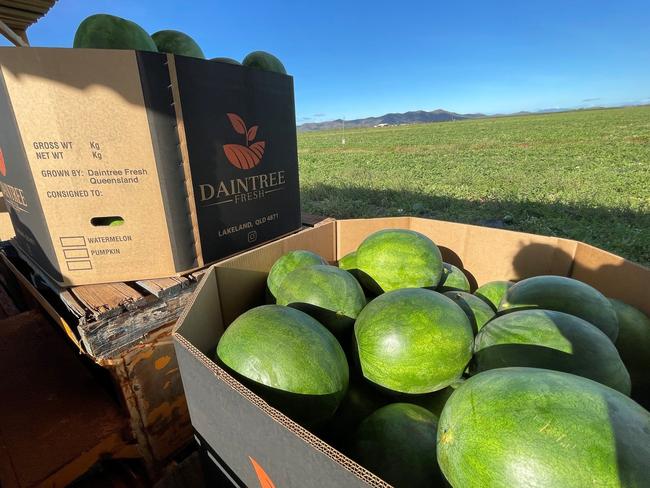
Exporting ‘difficult’
Mr Jackson, a former seed dealer who has been growing melons on the Cape York Peninsula for the past seven years, said he no longer dealt with the supermarkets because “I know what they’re like”.
“I set my business up at a size I could go to all the good independents,” he said.
“I starting growing a few specialty melons and sent them over to Japan, they loved them. We went from 50,000 boxes to 150,000. This year we’re going to do 250,000 boxes to Japan. Eighty per cent of my products are now going to Japan.”
He describes his “beautiful melons” as “very sweet”.
“We use low nitrogen, probiotics in the ground, we end up with really sweet, very firm and good shipping fruit,” he said. “Everyone who eats honeydew, [usually] it’s like a green cucumber — ours are absolutely delicious, if you had one you’d start eating honeydew again.”
But Mr Jackson said not many producers were able to go the export route.
“Exporting is really difficult and the quality standards are much higher than the domestic supermarkets,” he said.
“A lot of people have had a bad experience with exporting because if you don’t get it right, it’s a big risk. I nearly stopped myself because I had a load condemned, I lost nearly $300,000. It cost $150,000 to ship it and $150,000 to dump it.”
Mr Coote noted that unlike many other agricultural commodities, the vegetable industry has a “heavy reliance on the domestic market, with only 6 per cent of production exported, and therefore growers have few options to seek alternative markets for their product”.
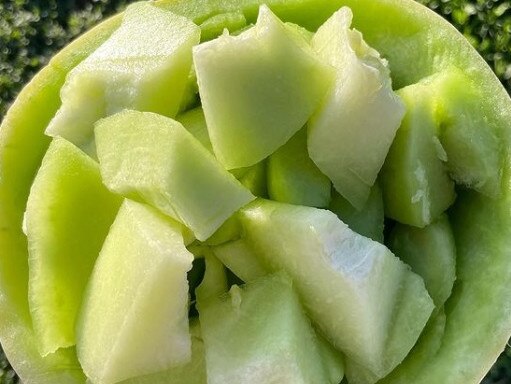
‘Fear of retribution’
Mr Jackson said he had spoken with “thousands of growers about their experience” with the supermarkets and “all of them are too scared to say anything”.
“They’re absolutely terrified of retribution,” he said, claiming the supermarkets would “just stop buying a brand” if growers publicly complained about their contracts.
Ms Chambers also said growers “have not spoken up about this” because there was a “genuinely real fear of retribution”. “Their experience is if they go out in public in any way they lose their contract,” she said.
The voluntary Australian Food and Grocery Code of Conduct, prescribed under the Competition and Consumer Act 2010, establishes an independent dispute resolution process where suppliers can take confidential complaints about their treatment to the supermarket’s independent arbiter, who has powers of remedy which include compensation up to $5 million.
“However due to the current dispute resolution process growers fail to raise complaints for fear of commercial retribution through loss of sales or entire supply arrangements,” Mr Coote said.
Ms Chambers stressed that supermarket contracts were “not the whole game”.
Over the past three years, she said profitability had taken a huge hit as growers experienced “30 to 65 per cent sustained increases in input costs”.
On top of that, “dozens” of industrial relations decisions had caused productivity losses and forced business models to change.
“For example, one Queensland grower is saying with the changes in IR he now has to reduce his PALM workers, from over 100 to 50,” she said. “That will remove 10 permanent workers out of the business as well.”
On the role of the supermarkets, Ms Chambers said that “when you have one link in the supply chain making record profits and potentially multiple links making substantial losses, that is why it’s being questioned”.
“Major retailers have a responsibility to their shareholders to make a profit, however in this age of modern slavery statements and so on, I believe growers are operating under some modern slavery conditions,” she said.
“They are not being paid enough for their work. Something is going astray.”
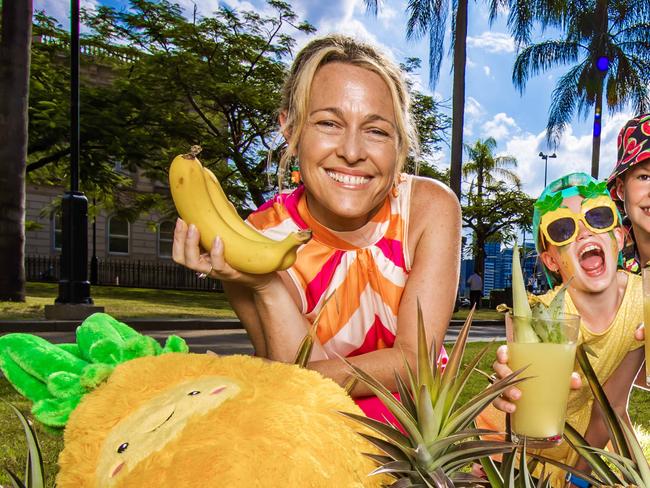
Supermarkets respond
A Woolworths spokeswoman noted that “right now, our vegetable category is in deflation — meaning prices on average are lower than 12 months ago — because we’re passing lower wholesale prices on to our customers”.
“In zucchinis for example, farmers have just delivered a bumper crop to market, resulting in lower prices — this week they’re down 40 per cent in store and we’re selling 20 per cent more volume,” she said.
“However, when it comes to melons, there’s reduced supply at the moment and in recent weeks we’ve paid suppliers as much as double what we did this time last year. Supermarkets are not the only market for fruit and veg, with channels through restaurants, fast food, meal kits and export all available to growers to sell their produce.”
She added it was “hard to address” Mr Jackson’s claims “when we don’t actually have a relationship with this farmer”.
“It’s not clear what experience these claims are based on,” she said.
“We want to hear from any growers who have specific concerns about our conduct — whether they contact us directly, our Independent Code Arbiter or via the confidential whistleblower hotline.”
A Coles spokeswoman said there were “many factors that influence the price that customers pay for fresh produce”.
“When it comes to the price of melons, variables such as the time of the season it is, the region that they are grown in, their quality as well as the weather plays a big part in customer demand, which all influence the price,” she said.
“As is the case for all fresh produce, the shelf price entails the price we pay our suppliers and additional cost factors such as processing, transport, labour, packaging and other costs associated with getting a product ready to go on shelves for our customers to enjoy.”
She said Coles sells “100 per cent Australian grown melons throughout the year and we have partnered with numerous growers across the country in number of growing regions to source and achieve this offering for our customers”.
“We are proud of our strong long-term partnerships and work closely with our suppliers to ensure transparency on costs, to provide great value for customers,” she said.
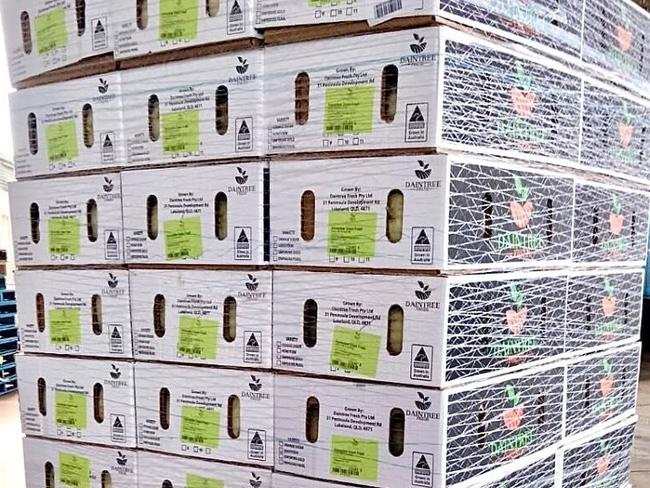
Selling ‘at a loss’
Ms Chambers said there was a “huge variation” in the relative costs and risks between farmers and supermarkets that led to a power imbalance.
“Growers pay for seed stock, root stock, water, fertiliser, all the labour, cardboard, labels in-store, supermarket training so people don’t bruise their produce, all of those things go into the cost of one piece of fruit, veg or nut, the grower holds the whole burden,” she said.
“It gets to the supermarket and because of supply and demand, and [the fact that] it’s a perishable product you may only have a day to sell, a lot of that pressure is put on the grower and they just sell it or whatever they could be offered — and a lot of the time that it’s at a loss.”
Mr Coote agreed that Australian vegetable growers have “little control over the prices and terms of trade for their products, and currently have very few protections in their relationships with the limited number of retailers that control the Australian domestic market”.
“Australian growers enter into supply agreements with no certainty of price, and little certainty that the projected commitments for volume will be adhered to,” he said.
“The weekly price negotiations already have growers at a distinct disadvantage as many vegetable products are highly perishable, and with a narrow harvest window, so therefore growers have little option but to accept the nominated price or let their crop go to waste.”
Mr Jackson alleged the supermarkets were “holding down” wholesale prices.
“The truth is a long time ago the ACCC let two companies own our fuel, our food and our [alcohol] and they own total control,” he said.
“They say there’s competition — bulls**t. Coles and Woolworths send their staff around [to each others’ stores] with a little notepad to make note of prices. They’re manipulating the market. When you own 76 per cent of the food supply, it’s a perfect excuse.”
He argued “the fact their prices are so high is actually the manipulation itself because they’re slowing down buying”. “If you put pumpkins on special for $1.50 the market would clear and the price would kick — that’s the last thing they want,” he said.
“That’s how they manipulate the market. The prices prove the competition isn’t there. There’s no way they’d make 400 per cent margins on that stuff if there was competition.”
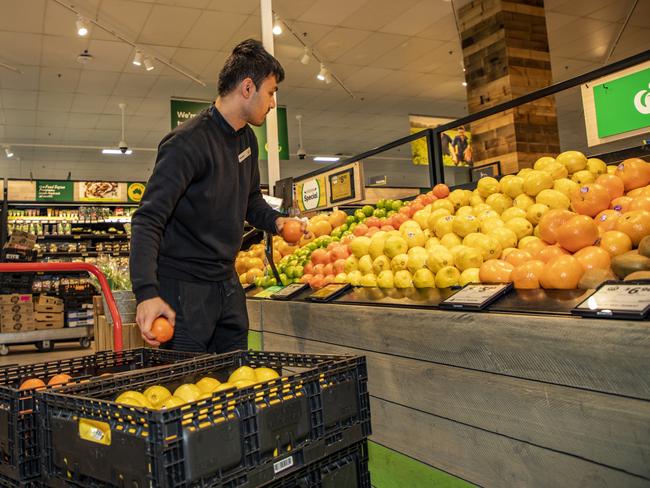
‘Publish the prices’
Mr Jackson has called for supermarket prices paid to growers to be made public.
“I’m trying to get my industry to publish the wholesale prices on social media and in the paper,” he said. “If we were to publish our wholesale prices, what would people think? That shows what [the supermarkets] are doing. People are scared to do it.”
He said many growers were “getting the same prices we were getting 10 years ago”. “Watermelons, 70 cents to $1 was happening 30 years ago, the same for rockmelons and honeydew, $10 to $30 a box 30 years ago,” he said.
“Growers have done that through efficiencies and size, but they’re now down on their knees.”
In Queensland, 10 to 15 years ago around 80 per cent of all fresh produce ran through the central market at Rocklea, and those market floor prices are still available to growers.
But Ms Chambers said that had now flipped, with 80 per cent sold direct to supermarkets.
“Growers don’t have access to prices sold into retail, all of that is like a black box,” she said. “The supermarket does not release what they paid for it and a grower, if they’ve got a contract, is unable to release what they sold it for.”
Growers have approached the industry body about providing that data confidentially to produce average numbers, but Ms Chambers said it would be a complex process.
Still, she said the industry should “start calling out” the “unfair advantage”.
“The big retailers see all the grower data nationally — if I’m sitting there as a buyer I can see everything, I know what’s in the supply chain, I know how hard I can go bidding growers down,” she said.
“As a grower I don’t even know what my neighbour’s got, and if I went and asked him that would be collusion.”
More Coverage
Originally published as Aussie farmer shipping ‘beautiful melons’ to Japan rather than deal with Coles and Woolworths





